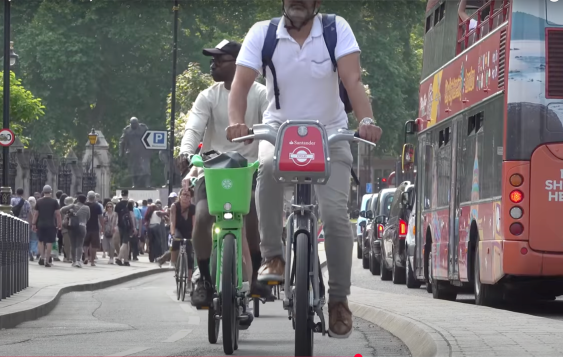Rep. Jim Oberstar (D-MN), chairman of the House
transportation committee, made an interesting
comment earlier this month in the Journal of Commerce:
 Former Rep. Bud Shuster (R-PA) struck a deal 11 years ago that sealed off transportation money. (Photo: NYT)
Former Rep. Bud Shuster (R-PA) struck a deal 11 years ago that sealed off transportation money. (Photo: NYT)Infusing cash to keep the Highway Trust fund afloat at the end offiscal 2009 is a matter of payback, Rep. James Oberstar, D-Minn., saidMonday.
Oberstar [said] that the U.S. Treasury owes thetrust fund $21 billion plus interest since Congress agreed to shift atrust fund surplus to the general fund in 1998.
Can
that really be true? Even in the post-bailout age, $21 billion is a lot
of money. And if it is true, why is everyone from the House GOP to the National Governors Association pressing for a highway trust fund fix right now (or five minutes ago)?
For
the answer, let's hear from Bud Shuster, the Pennsylvania Republican
and former chairman of the House transportation committee. Shuster had
a well-earned reputation as a deal-maker -- he masterminded the
construction of Interstate 99
in his home state, dubbed the "road to nowhere" by critics -- and
during the drafting of the 1998 federal transportation bill, he set out
on a quest to end all quests.
Shuster wanted to reverse President Lyndon Johnson's move to put
the highway trust fund, which collects gas tax revenue to fund
transportation projects, into the government's unified budget. Here's
Shuster, explaining himself:
Sinceits incorporation in 1969 into the unified budget, the highway trustfund had been borrowed from to mask and finance other generalfund spending. This was a fraud, and it was wrong, and our committeewent through a 3-year effort to end this shameful practice and restoreintegrity into the Highway Trust Fund, which culminated in the passageof [the 1998 transportation bill]. ...
The 1997 balanced budget agreement held that the highway andtransitspending was $12 billion below the tax revenues coming in to the trustfund during the periods of 1998 to 2002. The budget was being balancedin part by using highway trust funds. We believe that is justfundamentally wrong.
To
remedy this perceived wrong, Shuster pushed to prevent the highway
trust fund from being used to shrink the effective size of the federal
deficit. Yet taking the fund "off budget" to guarantee future funding
for transportation projects was not popular with the congressional
appropriators who control the federal purse.
Shuster had to
compromise to make it happen. He agreed to forgo the interest accrued
by money in the highway trust fund -- a move that Rep. John Lewis
(D-GA) recently proposed to undo -- and assume a balance of $8 billion in the nation's transportation spending account. In Shuster's words:
[W]e agreed that in return for ensuring that the trust fund would not beborrowed from in the future, we no longer credited the trust fund withinterest and eliminated most of the cash balance. Let me emphasizethis. This was a key part of our concession.
Shuster
and Oberstar, who was then the transportation committee's senior
minority member, viewed the deal as a transfer of $29 billion in
projected gas tax surpluses to the Treasury.
But not everyone in Congress agreed. Last year, Republicans on the Senate Budget Committee dismissed Shuster's version of events as "colorful" and "invented," asserting that only $8 billion in actual transportation money was given up.
Still,
let's assume for a moment that the House transportation committee's
math is correct. Oberstar's contention that the Treasury owes the
highway trust fund $21 billion would account for the estimated surplus
that was ceded in 1998, minus the $8 billion transfer that was approved last summer.
Even
then, it stretches credibility to imagine that restocking the highway
trust fund this summer could easily be done by reneging on the
11-year-old budget deal that first took money out of the account.
Congress being the tradition-bound and cautious institution that it is,
the highway account's looming $7 billion shortfall is bound to be more
than just "a matter of payback," as Oberstar put it.
In fact, advocacy groups already are pushing to tie the trust fund rescue to reforms of the existing transportation system.





